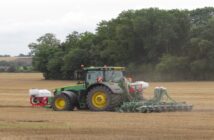Bayer has joined the Centre for Crop Health and Protection (CHAP) located on the National Agri-Food Innovation Campus, Sand Hutton, United Kingdom. The CHAP serves as an international centre for innovation in crop protection uniting public academic institutions and private companies. The partnership will focus on plant health to improve agricultural productivity as a vital aspect of food security.
Whilst the causes of low productivity are complex, one major contributory factor is crop field losses due to plant health problems. CHAP and its partners will advance new longterm solutions for crop health and protection involving the application of the best currentscientific techniques as well as the development of new approaches.
“We are excited to work as a partner of CHAP with a clear objective of developing solutions which help farmers to meet diverse challenges such as weed and disease resistance, the impact of climate change, and the need to reduce crop losses in agriculture,” said Dr. Adrian Percy, Head of Research and Development at Crop Science, a Division of Bayer.
Dr. Arnd Nenstiel, Head of Agricultural Policy & Stakeholder Affairs at Crop Science, emphasized that “this partnership will enable us to develop solutions together with food retailers, processors, agronomists and research institutions.”
“Bayer becoming a partner is an exciting opportunity for CHAP,” said Adrian Barraclough, Operating Officer at CHAP. ”The expertise and knowledge that Bayer will bring will not Joint development of innovative crop protection solutions in agriculture: only strengthen what we can offer in crop protection but it will also enhance the development of solutions in global farming.”
Dr. Richard Schmuck, director of Environmental Safety at Crop Science, added: “CHAP will provide Bayer with early access to multiple innovative research institutions and help promote the development of risk-based regulatory frameworks.”
The Centre for Crop Health and Protection (CHAP) was launched in April 2016 after securing more than GBP 21 million of Government funding as part of the Government’s long-term Agri-Tech strategy. It has been established to bring together leading expertise, knowledge and resources from the UK’s foremost research organizations and industries.
Consortium partners from across the UK include Farmcare, Frontier Agriculture, Dow AgroSciences, Tesco, Stockbridge Technology and Unilever, alongside the Agriculture and Horticulture Development Board (AHDB), the Centre for Agriculture and Biosciences International (CABI), Cranfield University, FERA Science Ltd, Newcastle University, ADAS UK Ltd., The Met Office, Warwick University, Campden BRI and Rothamsted Research.



